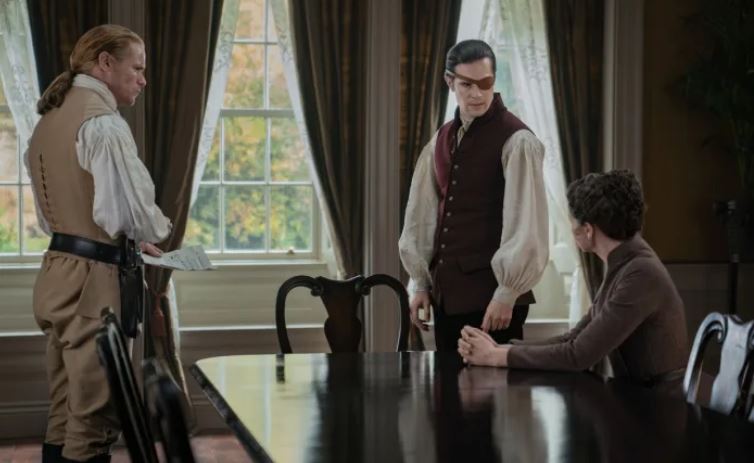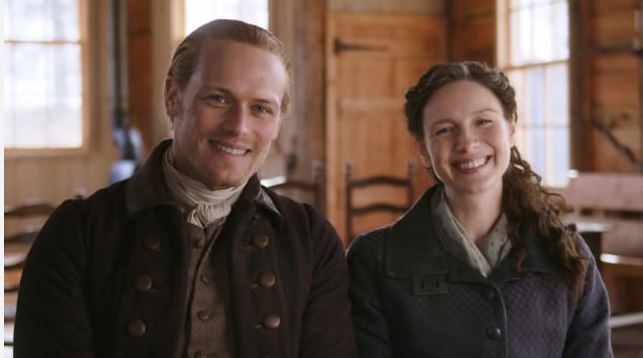Outlander kept one of the best episodes until close to the end of the season, “Ye Dinna Get Used to It,” and I say best because it was written by Diana Gabaldon herself, the New York Times bestselling creator of the Outlander series of novels.
Happily, Parade has an exclusive conversation with Gabaldon about the sixth episode (out of eight) in Season 7 Part 2, starting with how much fun it was to write as it has so much development with major characters Jamie (Sam Heughan), Claire (Caitríona Balfe) and Lord John (David Berry), and so much is taken from her book.
In order to make this a timely story, we did chat with Gabaldon prior to her having the opportunity to rewatch the episode—the Christmas holiday and all—so she does admit that there are some things that she doesn’t recall.
“They did change quite a bit from the first draft, but largely to change emphasis (less time devoted to William [Charles Vandervaart] and Jane [Silvia Presente], more to Hal [Sam Hoare] and John, cut down a lot of the Bree [Sophie Skelton]/Rob Cameron [Chris Fulton] stuff (which I didn’t object to), rather than plot.

“Some lines were changed—when Claire (book) sees Jamie in his new uniform and he asks whether he looks decent to inspect troops, she replies, ‘You look like bloody Mars, god of war. You’re likely to frighten your men.’ To which he replies, ‘I want them frightened of me. It’s my best chance of getting them out of this alive.’ That was (I believe) changed to JAMIE: ‘Do ye like it? CLAIRE: ‘I’d be lying if I said I didn’t.’
“OK, there’s nothing wrong with either version, but it does alter the focus. In the original (from the book, and in the original script), the focus is on Jamie’s concern for his as-yet-unknown troops and his worry about leading a large company of men who don’t know him, or he, they. In the changed version, the emphasis is on the relationship between Jamie and Claire.
“There’s nothing ‘wrong’ with either one; it’s just where you want to place the focus of a scene or story, and in some contexts, one version might be better for the other medium. (i.e., I have all the room I need to do just about anything I want; I can take the time to show Jamie’s uncertainty about leading a much bigger group of men than he ever has, under urgent conditions. The show can’t, because they don’t have room. If they have to pick and choose between the elements of a book-scene (and they do), they’ll usually go for the briefest/most condensed version.)”
“Ye Dinna Get Used to It” is the episode in which Jamie, Claire and Lord John have a rapprochement. This is the first time they’ve all been together since the reveal that Lord John and Claire had sex, and Lord John definitely feels he is owed an apology by Jamie, but Jamie is not big on apologies, even when he may know deep down that there is something to apologize for.
“Well, again, this is the show condensing and abbreviating what is (in the book and the original script) a more complex conversation,” Gabaldon comments. “They need to fix the situation (at least temporarily) and get on to the next major bit. Speaking generally, though, Lord John feels (very justifiably) affronted by Jamie’s beating him to a pulp. Jamie may be superficially regretful, but the bloody Highlander and possessive male is bubbling along just below the surface, and he’s too honest to tell social lies. Claire knows both men much too well at this point to expect that things will immediately go back to normal, much as she’d like them to. At the moment, she’ll accept anything that lets them have a conversation.”
There is also a fun scene in this episode where Jamie and Claire dine with George Washington and the Marquis de Lafayette in an expanded dinner that was moved from its original setting in the book to the dining room in Lord John’s house in the series.
There’s a great line where Washington says, “This dinner won’t make the history books,” but it does make Gabaldon’s novel. We asked her how it feels to put words in the mouths of these historic characters.
“Well, Washington’s line isn’t something either Washington or I would actually have said (for assorted reasons; Washington and his generals were a whole lot more concerned about survival than with how they’d look 200 years hence, and by and large, you really shouldn’t pull the reader/viewer out of the moment), but it’s mildly funny. I liked Lafayette a lot <g>. Book, show and real life (or as much approaching reality as historical sources allow).
“When I do dialogue (in the book) for a character who was a real person, I try to find as much as I can of what they actually _did_ say, especially if they wrote letters or journals that have been preserved or quoted—and beyond that, to at least superficially understand both what made that person tick, and the style of their speech.

“(Hence, Benedict Arnold’s conversation with Claire, which was his style: graceful, charming, and philosophical—and his yelling, “Shoot him!’ at his soldiers (with regard to General Fraser), which was a direct, if not strictly literal, quote <g>.)
“The show writers don’t have the time or resources to do that; their dialogue has to be very condensed. Generally, they do a good job, and occasionally they’ll do something that makes sense in their context but is way off historically (either in terms of fact, or using a too-modern figure of speech, or something that (I know) a particular character Just Wouldn’t Say (for reason X, Y and Z).) When this happens, I tell them about it, and about half the time they fix it.
“A writer of historical fiction is always walking a tight-rope between fact (insofar as they’re known—and quite often, they aren’t) and extrapolation. And dialogue is in itself an art, regardless of its subject.”
New episodes of the second half of Outlander Season 7 will premiere at midnight ET on the STARZ app, all STARZ streaming and on-demand platforms each Friday. On linear broadcast, it will debut on STARZ Friday nights at 8 p.m. ET in the U.S.
